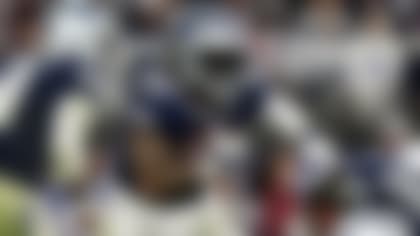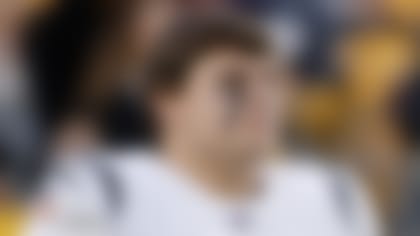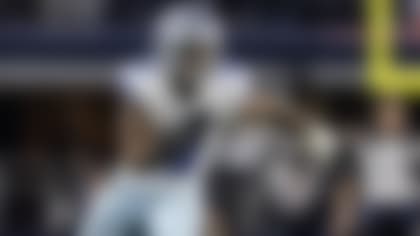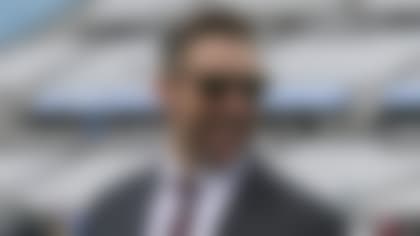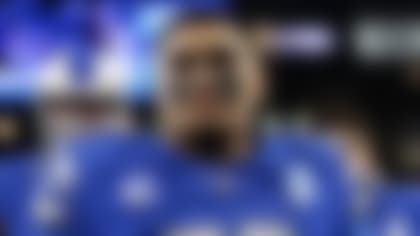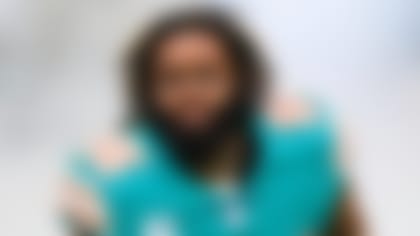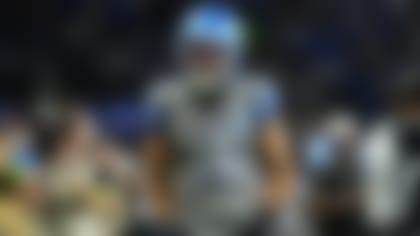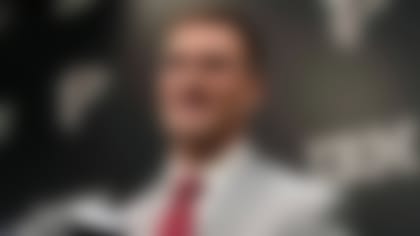It's been nearly 18 months since the dawn of the deflated football saga that has engulfed Tom Brady and the NFL.
On Wednesday, the U.S. Second Circuit Court of Appeals denied a petition by Brady and the NFL Players Association to rehear his suspension case, meaning the New England Patriots quarterback's last opportunity to dissolve the NFL-issued punishment would have to come in a decision by the U.S. Supreme Court. On Friday, Brady announced he was giving up the fight, saying he has "made the difficult decision to no longer proceed with the legal process."
Here is a timeline of the entire process:
Jan. 18, 2015: Reports surfaced that NFL is looking into the Patriots' use of "deflated footballs" in the AFC Championship Game victory over the Colts. Midway through the game, a ball was taken off the field and out of circulation, a league spokesman told NFL Media Insider Ian Rapoport at the time. Per the NFL rulebook, game balls must be inflated with between 12.5-13.5 pounds of air. Each team must provide 12 primary balls for testing prior to the game. NFL VP of Officiating Dean Blandino told NFL Network that, "it's not unheard of for a ball to be removed from circulation and then tested during the week for whatever issue there was."
Jan. 20: NFL found that all 11 footballs used by the Patriots were underinflated.
Jan. 22:Patriots coach Bill Belichick denied knowledge of deflated footballs during 23-minute news conference.
"The National Football League is investigating this situation," Belichick said. "We have cooperated fully, quickly and completely with every request that they have made; (we) continue to be cooperative in any way that we can. I have no explanation for what happened. That's what they're looking into. So I can't comment on what they're doing. That's something that you should talk to them about."
Jan. 22:Tom Brady told reporters during news conference: "I would never do anything to break the rules."
"I go in and I take the footballs that I want to use for the game," Brady said. "Our equipment guys do a great job with breaking the balls in. They have a process that they go through. When I pick those balls out, at that point to me they are perfect. I don't want anyone touching the balls after that, I don't want anyone rubbing them, putting any air in them, taking any air out.
"To me those balls are perfect and that's what I expect when I show up on the field. So that happened obviously on Sunday night, is the same process that I always go through. I didn't think anything of it."
Jan. 23: NFL announced Ted Wells has been appointed to investigate the deflated footballs.
Jan. 26:Patriots owner Robert Kraft vehemently denied wrongdoing by his team, expresses desire for apology from NFL if team is exonerated.
"If the Wells investigation is not able to definitely determine that our organization tampered with the air pressure in the footballs, I would expect and hope the league would apologize to our entire team and in particular coach Belichick and Tom Brady for what they have had to endure the last week. I am disappointed in the way the entire matter has been handled and reported upon," Kraft said.
"I want to make it clear that I believe, unconditionally, that the New England Patriots have done nothing wrong."
May 6:Ted Wells Report released, finds that "it is more probable than not that Jim McNally (the Officials Locker Room attendant for the Patriots) and John Jastremski (an equipment assistant for the Patriots) participated in a deliberate effort to release air from Patriots game balls after the balls were examined by the referee." It also finds that it is "more probable than not that Tom Brady was at least generally aware of the inappropriate activities of McNally and Jastremski involving the release of air from Patriots game balls."
The report said that other Patriots personnel were not aware of the effort.
"We do not believe that the evidence establishes that any other Patriots personnel participated in or had knowledge of the violation of the Playing Rules or the deliberate effort to circumvent the rules described in this Report. In particular, we do not believe there was any wrongdoing or knowledge of wrongdoing by Patriots ownership, Patriots Head Coach Bill Belichick or any other Patriots coach in the matters investigated."
May 11: The NFL announced that Tom Brady has been suspended without pay for four games for violating the NFL policy on the integrity of the game. This news comes less than a week after independent investigator Ted Wells found that it was "more probable than not" that Brady was "at least generally aware of the inappropriate activities" regarding the deflation of Patriots game balls used in the AFC Championship Game against the Colts.
The team was also fined $1 million and will forfeit a 2016 first-rounder and 2017 fourth-round selection in the NFL Draft.
May 14:Patriots issued response to Ted Wells Report, via a website called WellsReportContext.com. "The conclusions of the Wells Report are, at best, incomplete, incorrect and lack context," the introduction to the website reads. "The Report dismisses the scientific explanation for the natural loss of psi of the Patriots footballs by inexplicably rejecting the Referee's recollection of what gauge he used in his pregame inspection. Texts acknowledged to be attempts at humor and exaggeration are nevertheless interpreted as a plot to improperly deflate footballs, even though none of them refer to any such plot.
"There is no evidence that Tom Brady preferred footballs that were lower than 12.5 psi and no evidence anyone even thought that he did. All the extensive evidence which contradicts how the texts are interpreted by the investigators is simply dismissed as 'not plausible.' Inconsistencies in logic and evidence are ignored."
May 14: The NFLPA filed an appeal of Tom Brady's four-game suspension on his behalf.
Upon filing the appeal, the NFLPA released the following statement:
"The NFLPA has filed an appeal of the four-game suspension of Tom Brady handed down by Troy Vincent. Given the NFL's inconsistency and arbitrary decisions in disciplinary matters, it is only fair that a neutral arbitrator hear this appeal. If Ted Wells and the NFL believe, as their public comments stated, that the evidence in their report is 'direct' and 'inculpatory,' then they should be confident enough to present their case before someone who is truly independent."
May 19:Patriots owner Robert Kraft announced at the Spring League Meeting that the team will not appeal its punishment.
"Although I might disagree with what is decided, I do have respect for the commissioner and believe that he's doing what he perceives to be in the best interest of the full 32," Kraft said during a six-minute address to reporters. "So in that spirit I don't want to continue the rhetoric that's gone on for the past four months. I'm going to accept, reluctantly, what he has given to us and not continue this dialogue and rhetoric and we won't appeal."
May 29:Tom Brady's appeal to reduce a four-game suspension set to begin on June 23.
June 2: Commissioner Roger Goodell informed NFLPA he will not recuse himself from Tom Brady's June 23 appeal hearing. In the letter to the union, Goodell said that he does not feel prejudiced on the matter."My mind is open," he wrote. He added: "Because protecting the integrity of the game is the Commissioner's most important responsibility, I decline to rewrite our Collective Bargaining Agreement to abrogate my authority and 'discretion' to hear 'any appeal' in a conduct detrimental proceeding."
June 23:Tom Brady's appeal for his four-game suspension ended Tuesday evening at NFL headquarters after ten hours of testimony, the NFL announced.
July 28: Commissioner Roger Goodell upholds Tom Brady's four-game suspension. In ruling, Goodell stated that Brady instructed his assistant to destroy the cellphone that he had been using since early November 2014, a period that included the AFC Championship game and the initial weeks of the subsequent investigation. Brady instructed his assistant to destroy the phone the very day he was interviewed by Ted Wells.
Aug. 12:Tom Brady and Commissioner Roger Goodell meet in court, with Judge Richard M. Berman questioning the lawyers from both sides. Berman urges the two to settle and sets another court date for Aug. 19.
Aug. 19: Judge Richard M. Berman continues to urge both parties to settle on their own. Berman sets the next court appearance for Aug. 31, requiring both Tom Brady and Commissioner Roger Goodell to attend.
Aug. 31: Judge Richard M. Berman informs both sides they're too far apart in negotiations. Berman announces a ruling on the case could come no later than Sept. 4.
Sept. 3:Tom Brady's four-game suspension is nullified by Judge Richard M. Berman. Brady is now eligible to play for the Patriots in Week 1. One of Berman's key points is that Brady did not receive the proper advance notice to be disciplined by the NFL and information of the kind of penalties he could receive.
Commissioner Roger Goodell announces in a statement that the league has appealed the ruling in order to uphold the collectively bargained responsibility to protect the integrity of the game. NFL Media Insider Ian Rapoport reports the league will not seek a stay to keep Brady off the field under its appeal.
Sept. 25: The NFL files a motion for an expedited briefing schedule in its appeal of Tom Brady's dissolved suspension ruling. The NFL Players Association consents to the motion.
Oct. 26: In appeals brief filed with the U.S. Second Circuit Court of Appeals, the NFL lawyers argue it's "unfathomable" that a judge could decide to lift Brady's suspension. They state Judge Richard Berman reached an "inexplicable" conclusion when he determined that the league failed to adequately warn Brady of the potential suspension and made errors in its investigation that required him to nullify the penalty.
Dec. 7: NFLPA files a 73-page appeals brief in response to the NFL's brief. The NFLPA asserts again that Goodell overstepped his authority by suspending Brady.
Dec. 21: NFL files its final appeals brief to the Second Circuit Court in response to NFLPA's brief. The league argues the collective bargaining agreement gives Goodell permission to discipline players for actions that are deemed detrimental conduct.
March 3, 2016: A three-judge panel with the U.S. Second Circuit Court of Appeals listens to arguments from the NFL and Brady's lawyers during the appeal hearing. During the one hour, 13-minute hearing, the judges directed a barrage of questions at lawyers for both sides, with the most pointed saved for Jeffrey Kessler, Brady's attorney.
The judges also asked repeatedly about the destruction of Brady's cell phone while the investigation into Deflategate was on-going and about the deference to Goodell having the authority to act as an appeals officer, powers given to him in the CBA.
Kessler seek explaination for why Brady typically destroys his used cell phones, citing privacy concerns. But Kessler was cut off. "With all due respect," Judge Barrington Parker Jr. says. "Mr. Brady's explanation made no sense whatsoever."
Parker also raises a critical point with the NFL's lawyer, Paul Clement: Is Goodell's role as judge, jury and enforcer so different from most arbitration cases that it limits the deference courts traditionally give to arbitrator decisions?
April 25: The U.S. Second Circuit Court of Appeals reverses Berman's decision on a 2-1 ruling that reinstates Brady's four-game suspension.
In a 33-page decision, the majority opinion stated: "We hold that the commissioner properly exercised his broad discretion under the collective bargaining agreement and that his procedural rulings were properly grounded in that agreement and did not deprive Brady of fundamental fairness. Accordingly, we reverse the judgement of the district court and remand with instructions to confirm the award."
The court stated its ruling was more about upholding the power of the CBA and ensuring that Goodell did not overstep his written authority. Several times in the decision, the appeals court noted that their scope was fairly limited, and zeroed in on a few basic principles of the CBA.
"The basic principle driving both our analysis and our conclusion is well established: a federal court's review of labor arbitration awards is narrowly circumscribed and highly deferential -- indeed, among the most deferential in the law. Our role is not to determine whether Brady participated in a scheme to deflate footballs or whether the suspension imposed by the commissioner should have been for three games or five games or none at all. Nor is it our role to second-guess the arbitrator's procedural rulings.
"Our obligation is limited to determining whether the arbitration proceedings and award met the minimum legal standards established by the Labor Management Relations Act."
May 3: The Second Circuit grants Brady an extension until May 23 to decide whether to ask for a rehearing in front of the same three-judge panel or a new hearing -- called "en banc" -- in front of the entire circuit.
May 23: Brady's lawyers file a petition for rehearing of his suspension case against the NFL before the U.S. Second Circuit Court of Appeals. Brady's legal team, led by former U.S. Solicitor General Ted Olson, petitions for a panel rehearing or a rehearing en banc.
May 25:Patriots file an amicus brief in support of Brady and the NFLPA's petition for an en banc rehearing.
July 13: The U.S. Second Circuit Court of Appeals denies a petition by Brady and the NFLPA on to rehear the suspension case, meaning Brady's last opportunity to dissolve the punishment would have to come in a decision by the U.S. Supreme Court.
July 15: Brady announces via his Facebook page that he has "made the difficult decision to longer proceed with the legal process." Brady will accept his four-game suspension and be eligible to return to the field against the Cleveland Browns on Oct. 9.

